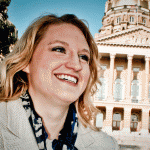
by | Aug 16, 2012
 The following is an interesting study released recently, and the reaction by the GOP (written up by Jill J.).
The following is an interesting study released recently, and the reaction by the GOP (written up by Jill J.).
In a policy study released by the Public Interest Institute at Iowa Wesleyan College, author Amy Frantz analyzed Iowa’s teen unemployment situation. The report notes Iowa’s unemployment rate for teens has remained consistently high over recent history. Two subgroups are analyzed within the data: teens ages 16-19 and high school graduates 18-20 years old.
The report notes that the unemployment rate for the 16-19 year old group was at a very high 12.3 % in 2002 and over the course of the last decade has remained at the high level, with the most recent report for 2011 showing that the unemployment rate for 16-19 year olds was 13.8%. This is much higher than the overall unemployment rate in Iowa which was just below 6% in 2011. Similarly, the 18-20 year old high school graduate group’s unemployment rate was 9.6% in 2002 and has risen higher, peaking in 2010 with a rate of 19.3% before coming down below 18% in 2011.
Not only are the unemployment rates higher, but an analysis of the number of hours worked for these two groups has seen a reduction in the last decade as well. The average number of hours worked per week for the 16-19 year olds in 2002 was 12.5 hours, but has dropped to 8.1 hours per week in 2011. Again, the 18-20 year old high school graduates faced a similar situation wherein their average hours worked in 2002 was 21.1 per week, falling to 16.7 hours per week in 2011.
The study references the rise in minimum wage as one of the driving forces behind the tremendously high teen unemployment rate. Iowa’s minimum wage was raised by the Iowa Legislature and Governor Culver in 2007 from $5.15 per hour to $6.20 per hour, and then in 2008 it was raised to $7.25. The federal minimum wage was also raised by the Democratically-controlled Congress, up to its current level of $7.25 an hour, matching Iowa’s rate. The study links this rise of the minimum wage to the increase in teen unemployment rate, noting that “teenagers are five times more likely to earn the minimum wage than adults. Thus the impact of an increase in the minimum wage would be felt dramatically by that segment of the workforce.†Those most hurt by a rise in minimum wage are often the youngest and most unskilled workers as businesses cannot afford to pay increased wages for individuals that might not have the necessary training or productivity to bring to the business.
Lastly, the study proposes an idea on how to lower the teen unemployment rate in Iowa. The study proposes to create a “sub-minimum†wage for teen workers in the state, which would allow businesses to pay certain teens an amount below the minimum wage that would apply to all other workers. The study concludes with the observation that “The benefit of having a higher minimum wage is cancelled out if teen workers are receiving fewer hours of work. And for those teens that want a job but cannot find one, their wages are $0.â€

by | Nov 14, 2011
 This is part 1 of a 2 part interview.  Part 2 deals with Obama care, education reform, illegal immigration, the Tea Party, and other topics. It can be linked to at the conclusion of this installment, or by clicking here.
This is part 1 of a 2 part interview.  Part 2 deals with Obama care, education reform, illegal immigration, the Tea Party, and other topics. It can be linked to at the conclusion of this installment, or by clicking here.
With a 68% increase in population since 2000, and Bloomberg reporting it is now the fastest growing city in Iowa, there is no doubt that Ankeny is rapidly expanding.
As population over the last few years has shifted to Ankeny, so too has the ideological focus of the Republican Party shifted to the right. Just how far right this Des Moines suburb, and longtime Republican stronghold, has moved politically will go a long way in determining who wins the Republican primary to represent Iowa’s House District 37.
This impending barometer has been put in play by the candidacy of Tea Party Republican Stacey Rogers, who will be one of at least four Republicans seeking this house district’s nomination. I recently sat down with Ms. Rogers to discuss her political resume, her ideology, and how she would like to influence the future of HD 37.
The Background
Though she was born in Colorado, Ms. Rogers’ parents grew up on family farms down the road from each other near State Center, and in an ironic twist her mom actually attended high school with fellow HD 37 candidate John Landon. These roots caused her to return to Iowa during the summers as she was growing up, before eventually leading her to come back to our state for law school. After graduating in three years from Colorado State University she headed back for good and enrolled at the University of Iowa School of Law.
Her time attending law school at the University of Iowa pushed her into the world of politics, a push initialized by being exposed to and surrounded by a level of left wing ideology that took her by surprise. Having decided to politically engage, she applied and was granted the opportunity to spend a summer working in Arizona for one of the most esteemed Conservative think tanks in the Country—The Goldwater Institute.
In addition to this she has worked as a staffer for Iowa State Senator Mark Chelgren (R-Ottumwa), became active in The Iowa Tea Party, and recently served as Republican Graig Block’s campaign manager in his successful re-election bid to the Ankeny City Council. She is currently practicing law for the Ankeny based firm Block, Lamberti & Gocke, P.C.
The District
Paramount to gaining an understanding of a candidate is learning how they see their district, where they stand on local issues, and how they analyze their district’s role in the larger state-wide picture. Ms. Rogers has strong views on all three.
When asked about the district’s positive attributes, she pointed to its unique geographic make-up, “This district has some of Ankeny in it but it also has some rural areas in it, it really is a great sample of Iowa. The good thing about Ankeny is that it is growing but it still has that extremely small town feel where everybody knows their neighbor.â€
On an economic level she commented that, “For the most part, and compared to the way the economy is going overall, Ankeny is doing really, really well.â€Â Weighing in on the reason for the district’s Republican leanings and general weariness of ever-increasing taxes she noted, “Especially in the northern part of Ankeny, the people are largely living in new housing developments and they clearly worked hard for that money, and they worked for it recently.â€
Also making her list of positives is the relative high quality of the school system, something she largely attributes to the area’s residents, “Probably the greatest difference between Ankeny schools and the schools in Des Moines is the amount of parental involvement.â€
The school district and community involvement are both things that have been front and center recently as the city’s school board has made the somewhat controversial decision to split the town by simultaneously building two brand new high schools. Though not under the jurisdiction of the seat she is running for, Ankeny residents would no doubt be curious as to where she stood on this hot-button issue:
“Eventually two high schools were going to be a necessity; the questionable spending was that they somehow needed two identical high schools at the same time. I would have been against the second high school from the beginning but at this point you really can’t un-ring that bell. That whole debacle just exposed this community to debt and the threat of more debt that could threaten its status as an engine of economic growth and development right now, because people are not necessarily going to want to continue moving to Ankeny if there is that threat of more bonding.â€
While noting the need to heal the rift between more moderate Republicans and the Tea Party, she views this seat as having a particular function in the larger statewide picture:
“Whoever gets elected to this seat is going to have the opportunity to use this seat as a bully pulpit. We need to make sure we elect a Conservative that understands the importance of this seat, and that they have a chance to be the voice of the true Conservative position. Somebody under the golden dome needs to draw the line in the sand about what that position really is, and I think too often what happens is that the Republicans who are interested in ‘good governance’ offer the compromise solution up front and give up a lot of ground in that approach.â€
Issues From Last Session
The Budget
Even though Republicans controlled two of the three segments of government last session, you can count Ms. Rogers among the large contingent of Conservatives unhappy with the resulting state budget.
At the heart of this displeasure is what she saw as a tactical error by the Governor in structuring our outlays, “I think our budget this year could have been much lower, and that we sacrificed a lot to the idea of two year budgeting.â€
Instead of insisting on a two year budget, and eventually bartering in order to achieve it, she would have taken an alternate approach:
 “0% allowable growth was still an increase in funding for schools because it was fully funded, something that the Democrats never did—and we still gave up the 2% allowable growth in the second year in order to get the two year budget. I would much rather of had the fight about allowable growth again next year because I think people started waking up to the fact that we are actually giving the schools more money by fully funding them.â€
Commercial Property Taxes
The overwhelming evidence and the inescapable mushrooming nature of Iowa’s commercial property tax code resulted in a political rarity last session—partial bi-partisan agreement. The fact that nationally Iowa ranks in the top 10 in every type of property tax levied on commercial and industrial property, and that The Tax Foundation rated Iowa as the 45th worst business tax climate in the Country, led to all three players in our state government laying tax reform proposals on the table.
On the Republican side were competing proposals from the Governor and the House of Representatives. The Governor’s plan would have ultimately taken a bigger bite out of the bill currently paid by Iowa businesses and would have been the one a Rep. Rogers would have embraced, “I would probably have supported the Governor’s plan. It went deeper and I think that if you are going to do property tax reform then you need to do it all the way, and I think that his plan was a tougher stand than the House Republicans.â€
To read this articles conclusion, dealing with pending issues facing Iowa and analysis of this race, click here for part 2.
Photo Courtesy of Dave Davidson, whose work can be found at prezography.com

by | Oct 25, 2011
 This is the second installment of a two-part interview, to read part one click here.
This is the second installment of a two-part interview, to read part one click here.
Education
Governor Branstad’s legacy-minded education reform proposal has struggled to draw support since its release on October 3rd, and you can count Mr. Landon as one of those lacking in enthusiasm.
A core tenet of Landon’s philosophy is local control. The benefit he sees in applying this principle to education is that the parents of each child, and the teachers in the actual class room, will have their voices better heard and their concerns more directly dealt with,
“My first reaction (to the governor’s plan) is that it drives us towards more state control and more mandates on levels of performance. I think that we are going to have to reform the system, but I think that instead of less local control we need to focus on more local control. I think we need to make sure that the families, the school teachers, and the administrators all have their say on how this should be done. I really believe that parents and school teachers, the people who are in that sector, know the best for their kidsâ€.
Health Care
The Democrats failure last session to construct Iowa’s insurance exchange program in accordance with Obama Care means that a nasty, brutal fight awaits next year. By all accounts this will be one of the three most high-profile issues debated by the Iowa Legislature in 2012, and one that ultimately drew fellow candidate Stacey Rogers (R-Ankeny) into the race. Landon, for one, would have voted no last year on SF 404 and sounds ready to engage in the fight,
“What would guide me is local control. The rights of District 37 residents and the rights of Iowans have to come first. Anything that’s done has to be for their benefit and their economic interests. And frankly, I view Obama Care as unconstitutional from the get-go. I am not in favor of taking care of this through the government because they (the people) will not be taken care of the way they should be.â€
On Illegal Immigration
“I am a proponent of legal immigration. It is probably not that big of an issue in this particular district, but there are areas in Iowa where it is. As a state issue I would say that the Federal government, like in so many other things, has failed. I am against the taxpayer having to pay for the upkeep of people who have come here illegally.â€
Barring an unexpected Federal resolution to this problem Landon indicated a willingness to possibly engage at the state level, “If the Federal government won’t do it and they are going to continue to let the border be porous, from the standpoint of public safety and who is going to protect the taxpayer, there has to be a process that protects you the citizen.â€
On Varnum (Gay Marriage)
“That should have been decided by the voters. That is a monumental shift in society and voters need to have their say. If a constitutional amendment is the only way for voters to get their voice heard on it, then we need to do it.â€
On The Tea Party
In response to a question seeking his thoughts on the Tea Party and if he would consider himself a “Tea Party-ish†candidate, he answered, “I haven’t found anything in their platform that offends me or that I take issue with. I am for individual rights. I think people can make their own decisions and government would be well advised to pay attention to that. Having said that, I am part of the process and a consensus builder, I just don’t think you can go out there as a maverick and get a whole lot done. What I want is for Lincoln and Douglas townships to flourish and for Ankeny to flourish. The only way I can do that is by being an effective voice, and the only way to be an effective voice is to be a part of the process.â€
Race Analysis and Summary
The contest for the Republican nomination in House District 37 will be of elevated importance as the probability is high that the nominee will ultimately be the Representative. Due to the fact that the district has a 2,400 advantage in registered Republicans over registered Democrats in what is already shaping up to be a Republican wave year, it is likely that the nominee may run un-opposed. Even more likely is that if the Democrats do choose to field a candidate they will not bother to recruit a top-notch challenger or commit substantial resources to the effort.
In what could end up being a crowded field of Republicans, John Landon is a serious contender who will be in it for the long haul. He appears both fired up for the race and ready to put in the time and work that will be required to win the seat. The major pillars that his candidacy will be built on are: less intrusive government, more local control, simplicity in legislative solutions, sensitivity to Iowa’s taxpayers, and a vehement opposition to unfunded mandates.
In particular, emphasizing that the failure to make budget cuts leads to higher taxes and a crusade against unfunded mandates could garner wide-spread appeal in District 37.
As his background suggests he is clearly positioned in the race as the “business candidate.†While often times the “business candidate†moniker is attached to folks who have had professional success, it’s worth noting that the business-like way Mr. Landon breaks down large issues as he thinks through them suggests that he would translate these skills to governance should he be elected.
Though we are early in the process, as Republicans begin to look at the field they will find much to like about John Landon as a person and as a candidate.

by | Oct 24, 2011
 This is part one of a two part piece. A link to the second installment covering the topics of education, health care, illegal immigration, gay marriage, the tea party and an early analysis of this race can be found at the end of this article or by clicking on Part 2 here.
This is part one of a two part piece. A link to the second installment covering the topics of education, health care, illegal immigration, gay marriage, the tea party and an early analysis of this race can be found at the end of this article or by clicking on Part 2 here.
The population explosion the city of Ankeny has seen over the last ten years has brought many changes to this Des Moines suburb. Along with construction of a new high school and the surge of large retailers that accompany a population growth from 27,000 to 45,000 in one decade, Ankeny has also received a make-over in its state legislative districts.
In terms of the Iowa House, what resulted is for the first time Ankeny has been split into two House districts. Replacing old HD 70 are new political territories HD 37 and HD 38 (click for maps). While former HD 70 Representative Kevin Koester (R-Ankeny) is running in HD 38, the city’s other new district, composed of north Ankeny extending to Alleman and east to the Bondurant city line, finds itself without representation.
Recently I sat down with one of the candidates vying to be this district’s inaugural public servant, Republican John Landon.
Any voter sizing up a candidate who will speak for them at any level of government needs to seek answers to three basic questions—who are they?, where do they stand?, and why do they stand there? The following should give you a good feel for all three.
The Candidate
Mr. Landon is a fourth generation Iowan who grew up working on a family farm in Marshall County. After serving two years in the Navy, which included a tour in Vietnam, he returned to Iowa and earned a degree in Ag Business from Iowa State University. Following school he embarked on a 28 year career working for two international grain companies. After retiring from that business in 2002, he became a partner in the Iowa based Peoples Company. He, his wife Marvis, and their two children moved to Ankeny in 1994 where he became active in both his church and the Boy Scouts.
His reasons for getting into politics, and ultimately deciding to make this run, are both numerous and specific, “I became increasingly dissatisfied with state government over the last 12 years.†The root of this dissatisfaction first emerged from the exposure his business career gave him to industry regulations, “Lots of people in the Legislature make all these rules and say ‘hey that’s great,’ but they don’t understand the impact that they’re having on people and business—it has gotten to be a heavy blanket over business.â€
While his business dealings with the government may have laid the foundation, it was a trip to the State Capital over an issue that flared up in 2009 that proved to be the final impetus,
“There became a discussion in the state about the deductibility of Federal income taxes on our state returns. There was a public hearing and we drove down to the Capital and went into the House chamber for that hearing. And I saw the Speaker of the House rule over it like a little dictator with an iron fist, and eventually he threw us all out and cleared the gallery. I realized at that point just how far state government had become removed from the average citizen, and that got me activated.â€
The Issues
The Budget
When asked if a $6 billion annual budget was appropriate for Iowa, Mr. Landon clearly indicated that he would come in shooting for a much lower number, “I am strongly in favor of people keeping as much as their money as possible . . . we need to break this down and see what we are getting back for the taxes that we pay—and I’m struggling to see what we get back.â€
Directly related to the spending cuts that would be necessary to shrink our yearly outlay, I specifically asked about the $42 million in “targeted reductions and savings†the governor will be asking the legislature to approve next year and the political peril this may entail. He responded, “It’s going to be used as a hot issue no matter what happens, because you are dealing with people who are receiving public aid for their health care.â€
Though no specified cuts have been proposed, he would stand with the governor on this issue in theory, “We are talking about trying to find 2%-3% spent in inefficiencies,†a percentage he felt could in part be found using the Six Sigma method.
While noting the complexities involved, he is quick to draw a direct line from the failure to make budget reductions to the eventual higher taxes that they lead to,
“I want Iowans to have the best care possible but I also have a heart for the people who are paying taxes, I understand how complicated that balance gets. This is about the will of the people. This is the time where people have to stand up and say either I am satisfied to give up half my income or not. If that’s what they choose then fine, but I am here to tell you that it’s not fine, and it’s not working. There is no way that people can feel good about the current tax structure and what is going on. We cannot succeed by taxing ourselves to prosperity.â€
Taxes
One of the major issues to go unresolved last session was tax reform, and center stage in that debate was how to go about lowering commercial property taxes in Iowa. Should this issue come before a Representative Landon he would be inclined to support the largest reduction plan on the table. Interestingly, in addition to standing for cutting taxes he has some proposed solutions to address the root cause of our ever-growing tax burden, “When these school boards and community boards are faced with mandates for a rule the state is making and they are not sent any money to do it, it is going to end up in your tax receipt just as plain as day. And I think unfunded mandates ought to be absolutely unconstitutional and illegal in the state of Iowa.â€
When asked if this is something he would propose in legislative form on his arrival to the chamber, he replied, “That is a bill that needs to be brought forward and something there needs to be a good public discussion about.â€
Note: To read the rest of the story click here for Part 2

by Paul McKinley | May 28, 2010
 Paul McKinley is the Iowa Senate Republican Leader
Paul McKinley is the Iowa Senate Republican Leader
Iowans received more sobering news on the economy late last week. Unemployment ticked up to 6.9 percent with 116,800 Iowans out of work – an increase of 2,600 from the month before.
This news comes as Governor Culver is traveling the state touting his $1.7 billion dollar I-JOBS program that he promised would create 30,000 jobs and spur an economic revitalization of Iowa’s economy. But since unveiling his I-JOBS idea during the Condition of the State address in January 2009, Iowa has actually lost over 30,000 jobs while nearly $1.7 billion has been added to the state’s credit card.
Based on employment numbers from Iowa Workforce Development, the graph below illustrates the month by month unemployment numbers since Governor Culver announced his temporary work program.

Clearly, Culver’s expensive program has failed. Government cannot create jobs – it’s the private sector and small business that is the engine of job growth.
That’s why we need a new direction for Iowa – one that actually puts the focus on private sector job creation and puts Iowans back into good paying jobs in every county and community in this state.
Senate Republicans have a better plan.
Instead of empowering government bureaucrats to pick winners as is the direction taken by Governor Culver and legislative Democrats, Senate Republicans believe we must give entrepreneurs, employers and small business owners the tools they need to not only succeed today – but into the future as well.
Our detailed three point plan involves providing an immediate jolt of adrenaline to Iowa’s economy by offering aggressive tax incentives for hiring more Iowans while also cultivating good ideas and encouraging entrepreneurs to come forward to develop or expand their venture right here in Iowa.
In addition, our plan includes putting together an extensive volunteer commission of business leaders and entrepreneurs from around that state that will be tasked with identifying the onerous barriers and regulations that are holding back growth, development, expansion and job creation in Iowa. The Legislature and governor will need to act on these citizen suggestions.
When Governor Culver took office and legislative Democrats took over both chambers of the Legislature in January of 2007, Iowa’s unemployment was at 3.6 percent. Today it is on the verge of 7 percent.
Last year, Iowa lost 222 factories and two-thirds of Iowa’s counties lost population because of a lack of jobs. Today we remain 49th in the nation in friendliness to job creators according to US News & World Report and 41st according to the very reputable Small Business Survival Index.
We have now seen four years of sky high property taxes, irresponsible spending and generational debt. Year after year, Democrats have discussed and in some instances passed damaging anti-jobs legislation like gutting Iowa’s Right to Work status, decimating our worker’s compensation system, fundamentally altering our collective bargaining methods and implementing a property tax increasing prevailing wage.
We can and must do better. The status quo in Iowa cannot continue.
Senate Republicans know we can experience a 99 county resurgence. Iowa is filled with promise because we have wonderful people in welcoming communities who have a burning passion to build a better Iowa for their families, friends and neighbors.
We must begin to change direction, reignite the entrepreneurial spirit of the private sector and welcome the new economy of tomorrow. Let us again put our faith in the people to move Iowa forward instead of allowing government to hold us back.
As always, I welcome hearing from you and can be reached by phone at 515-281-3560 or by e-mail at [email protected]
Paul McKinley
Senate Republican Leader
www.mckinleyforiowa.com
www.facebook.com/paulmckinley
www.twitter.com/mckinleyforiowa

 The following is an interesting study released recently, and the reaction by the GOP (written up by Jill J.).
The following is an interesting study released recently, and the reaction by the GOP (written up by Jill J.).







